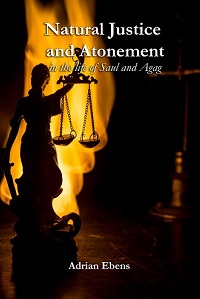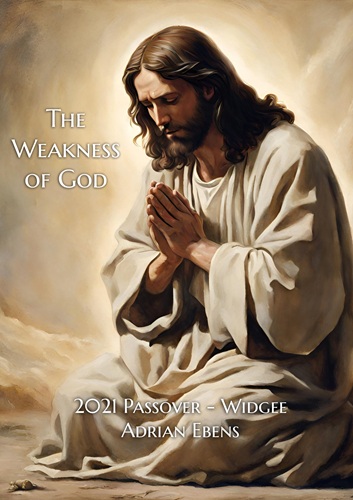Our Early Workers Position - Joseph Bates
I mentioned in my first blog that when I began to search what our pioneers wrote that they wrote strongly against the Trinity and that position was held for much longer than I had thought.
I want to give a brief overview of leading workers and what they wrote. Some of the statements may be familiar to some of you, but I want to also share some quotes from men that are not usually mentioned.
Notice carefully their position/responsibility within the Seventh-day Adventist church organisation, as this will then give a clear indication of the official Seventh-Day Adventist position on the teaching of the Godhead, including the Eternal Father, the Divinity of Christ, and The Holy Spirit.
As you will see through the next few articles, the church, in this period, was unified in its opposition to the trinity doctrine from the highest levels of the Seventh-day Adventist Organisation, including the General Conference Presidents themselves.
Who is “The God of our Fathers”?. Lets start with Joseph Bates and go step by step through the leading men.

Elder Joseph Bates
1792-1872 (80)
“At age 15, Joseph Bates "shipped" on a commercial vessel. For the next twenty-one years he lived the life of a sailor and ship captain. He returned to civilian life in 1828 with a small fortune. During the Advent Awakening, the retired sea captain became a respected evangelist and spiritual leader among the Adventists.
In early 1845, Bates was providentially led to an understanding of the truth concerning the seventh-day Sabbath, and in 1846 he published a 48-page tract on the subject. The respected Captain was the oldest member of our church pioneers, and he became the first Seventh-day Adventist local conference president (Michigan, 1861).
He lived to the age of 80. One reason for his physical endurance, in spite of many sacrifices, was his simple diet and temperate habits. He organized one of the first temperance societies in the United States. Bates was a spiritual man with clear-cut views and the courage of a lion. He did not hesitate to sacrifice when the need arose. Let us thank God for the venerable Captain -- apostle of the Sabbath truth.” {Vol. 1, No. 3 of "Lest We Forget" features Joseph Bates.}
Comments on the trinity by Joseph Bates
“Respecting the trinity, I concluded that it was an impossibility for me to believe that the Lord Jesus Christ, the Son of the Father, was also the Almighty God, the Father, one and the same being. I said to my father, ‘If you can convince me that we are one in this sense, that you are my father, and I your son; and also that I am your father and you are my son, then I can believe in the trinity.” {Joseph Bates, 1868, The Autobiography of Elder Joseph Bates, p 204}
“This, without a doubt in my mind, is owing to their previous teaching and belief in a doctrine called the trinity. How can you find fault with their faith while you are teaching the very essence of that never – no never to be understood, doctrine? ... We believe that Peter and his master settled this question beyond controversy, Mat 16:13-19; and I cannot see why Daniel and John has not fully confirmed that Christ is the Son, and, not God the Father.” {Letter from J. Bates to William Miller, 1848, as recorded in Past and Present Experience, p 187}
“My parents were members of long standing in the Congregational church, with all of their converted children thus far, and anxiously hoped that we would also unite with them. But they embraced some points in their faith which I could not understand. I will name two only: their mode of baptism, and doctrine of the trinity. My father, who had been a deacon of long standing with them, labored to convince me that they were right in points of doctrine. I informed him that my mind was troubled in relation to baptism. Said he, "I had you baptized when an infant." I answered, that that might all be according to his faith; but the Bible taught that we must first believe and then be baptized (Mark xvi,16;1Pet.iii,21), but I was not capable of believing when I was an infant. Respecting the trinity, I concluded that it was an impossibility for me to believe that the Lord Jesus Christ, the Son of the Father, was also the Almighty God, the Father, one and the same being. I said to my father, "If you can convince me that we are one in this sense, that you are my father, and I your son; and also that I am your father, and you my son, then I can believe in the trinity."” {J. Bates, The Autobiography of Elder Joseph Bates, pp. 204, 205.1868}
“One thing more: Much derision is made about those of our company that have joined the Shakers. I say it is a shame to them first, to have preached so clearly and distinctly the speedy coming of our Lord Jesus Christ personally to gather his saints - and then to go and join the Shakers in their faith, that he (Jesus) came spiritually in their Mother, Ann Lee, more than seventy years ago. This, without doubt in my mind, is owing to their previous teaching and belief in a doctrine called the trinity. How can you find fault with their faith while you are teaching the very essence of that never - no never to be understood, doctrine? … We believe that Peter and his master settled this question beyond controversy, Matt.16:13-19; and I cannot see why Daniel and John has not fully confirmed that Christ is the Son, and, not God the Father. How could Daniel explain his vision of the 7th chapter, if "Christ was God." Here he sees one "like the Son (and it cannot be proved that it was any other person) of man, and there was given him Dominion, and Glory, and a kingdom;" by the ancient of days. Then John describes one seated on a throne with a book in his right hand, and he distinctly saw Jesus come up to the throne and take the book out of the hand of him that sat thereon. Now if it is possible to make these two entirely different transactions appear in one person, then I could believe that God died and was buried instead of Jesus, and that Paul was mistaken when he said, "Now the God of peace that brought again from the dead ou[r] Lord Jesus that great shepherd of the sheep" &c., and that Jesus also did not mean what he said when he asserted that he came from God, and was going to God, &c.&c,; and much more, if necessary, to prove the utter absurdity of such a faith .” {JosephBates in a letter to William Miller, Past and Present Experience, pp. 187, 188. 1848}
There are those who claim that Joseph Bates simply brought his non-trinitarian views from the Christian connexion as if to suggest that Joseph Bates carried a mindless prejudice to the doctrine without carefully weighing the Scripture evidence. The arguments above are well reasoned and carefully weighed. Those who make such claims dishonour our forefathers an impute to them the charge of laziness in taking a position. Such a charge cannot stick to a man who helped form the solid platform of Adventism described by Ellen White in Early Writings.
I pray these quotes will stand as a testament to to the God of our Fathers - The Father and His Son





